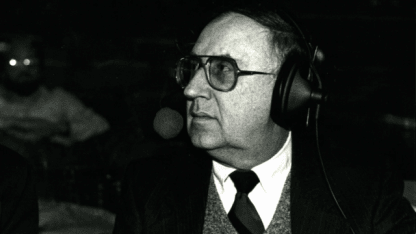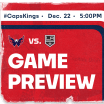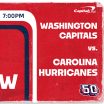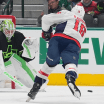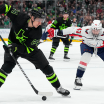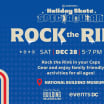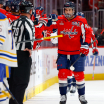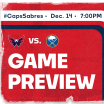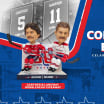WashingtonCaps.com (WC.com): You were the voice of the Capitals for over twenty years from the very beginning. What was it like watching the expansion franchise grow over time, making moves and eventually making it to the playoffs?
Ron Weber (RW): Well of course at the start they were bad. In fact, they had just about the poorest season ever for a National Hockey League team, but there are two things you have to think about, one was personal, one not. The one that wasn't was the fact that the Capitals and the Kansas City Scouts, the two expansion teams of 1974, got the slimmest pickings of any expansion teams in any leagues. Not only did the other NHL teams get to protect a huge amount of their players, leaving only table scraps for the Caps and Scouts, but the World Hockey Association had come into being and they picked off hundred of players that would have been available to the Caps and Scouts had that league not formed. So it was a lose-lose situation for the Capitals, and believe me, the Capitals lost. In their first four years, year three wasn't as bad, but the first four years they, you know, ate dust. After that they had a series of heartbreaks, just missing the playoffs for the next four years. A couple of times they changed the rules and both times they hurt the Capitals. When the top 16 would make the playoffs, regardless of division, they finished 17th. When the top four teams were bracketed by division they finished fifth, but with a better record than several other teams that were in other divisions. So it was heartbreak city, until finally they broke through in season nine. Personally the way I was able to put up with a record of 8-67-5 for year one and only 11 victories in the second season, that's 19 wins out of 160, is that, for the first time, I was the number one announcer for a major league team in some big league sport and I was happy as a clam to be there. I had tried for jobs in hockey, in basketball, baseball for years and couple of times made the final four but didn't make the final one. So this time I had it, and I was happy. One other point, I had been the back-up man, basically the color man for the Philadelphia 76er's when they went 9-73 back in the early 70's. That prepared me for the rough start and I saw how Bill Campbell, their main play-by-play announcer, handled it and it helped me.
WC.com: From your perspective, what did you see as a major turning point for the franchise?
RW: In retrospect I guess you could say in six months of retrospecting, it was obvious that the big trade that brought Rod Langway and three others in: Doug Jarvis, Craig Laughlin, as well as Brian Engblom. We gave up two good players, Rick Green and the captain Ryan Walter, but we got three, quite good players and one superstar in Langway, who would win two Norris trophies. He's just about the last defensive defenseman to get that award. That's what turned it around. It was on my birthday, September 10. David Poile, the new general manager, made the trade and from that moment on, in fact I can pin it down to one exact moment. Bryan Murray had taken over as coach and we went out to St. Louis. We got a 4-1 lead in that game, this was in late October, around the 27th or 28th of October, and St. Louis almost caught us. We got a goal late in the game and won by one. Beginning with that game, the Capitals lost only three of 25 games and they were off and running as a top third team. By that I mean in the next 15 seasons, 14 of those they would be in the top third of the league. They were a very good team, obscured by playoff failures in a lot of peoples' mind, but they were a very good team; not only in that they finished high in the standings, but that they had colorful players, and they were an interesting team to watch.
WC.com: How has the fan base and the energy in the city regarding hockey, changed over time in your eyes?
RW: I think among those that attended, they set up a big roar, they were as fervent as the attendees now, but there's no comparison with the fiber of the whole city, of the people that don't go to the games regularly, aren't season-ticket holders or partial planners or whatever. There are many more people aware and rooting for the Washington Capitals in the last, I can't put an exact number on it, but the last six, eight, ten years than there were before. There was enough to fill the stadium many times, or come close to it, but outside of those the numbers wasn't anywhere near what they are now.
WC.com: What was your favorite moment being the voice of the Caps?
RW: When Larry Murphy passed the puck to Dale Hunter and we eliminated the Philadelphia Flyers in the playoffs in the seventh game, that was the best moment ever. I hope someday I'll say, "No, no. The moment we won the Stanley Cup was even better." So the best moment hasn't come yet I like to think, but that was the best moment. That was a time when the Capitals led three games to one and blew the lead. Then led by three goals to one in that seventh game and let the Flyers come back and tie them and then it went into overtime. This was after we had lost a four-overtime game to be eliminated by the Islanders a year or two earlier and to come back and have Dale put that shot in behind Ron Hextall, I could see Hextall looking behind him seeing the puck in the net and just leaning over backwards in the net. As I phrased it, "Washington lives to play again." It wasn't something I had planned ahead of time, just the words that came to me and I still almost get goose bumps. One other thing I remember, the late Marv Brooks, the public address announcer, the fans didn't leave. Everyone just stood around, clapped, and high-fived each other, applauded the players and so forth. It wasn't the finals or even the semifinals of the Stanley Cup, but it was a very precious series win. Marv Brooks announced after saying, "Please drive home safe. Thanks for your attendance," blah, blah, blah. Then he said, "We will see you Monday." It was a Saturday night game and that meant we had qualified for the next round of the playoffs and we would host a game two days later. When he said, "We will see you Monday," they roared again.
WC.com: Do you still keep in touch with any former players or anyone in the organization?
RW: One of them in particular because he's my financial advisor, Bernie Wolfe, who was a second, third and maybe fourth year goaltender for the Capitals. So I see a lot of him and Bernie's kept us straight so we can take a cruise now and then. I see Yvon Labre around. It's mostly at the games, sometimes when I'm up in my seats, up in the upper part of the bowl there, I'll see Alan Hangsleben, Sylvain Cote. I keep in touch with even those that are no longer around Washington. Doug Jarvis is a very good friend of ours and I will go down to the visiting dressing room area before the game to see players. Most of them are now coaches that were players back in my time because I've been out this now for 15 years, but we do attend, my wife and I attend every game that we're here in Washington. Now with kids on the west coast and up in Massachusetts, we do take trips to see them and our grandchildren. Like I mentioned, we take a cruise and travel a lot, but if we're here in Wheaton, Md., and the Caps have a game that night, we're there.
WC.com: Can you tell me a little about what you've been up to recently?
RW: A lot of travel, as I said earlier. Luckily my wife still puts up with me. We spend a lot of time together now; I've embraced retirement since 1997. We have a good time. We do go visit our kids. I play a lot of tennis, some golf, go to a fitness center and watch a lot of television, baseball and hockey in particular.

